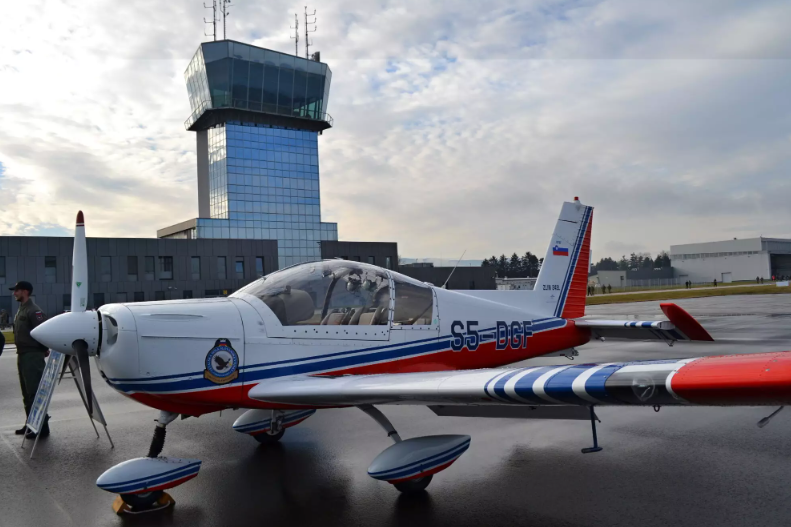The Ministry of the Environment, Climate and Energy has prepared a new climate law for inter-ministerial coordination, which is expected to be key in the transition to a more sustainable society that reduces greenhouse gas emissions and protects the environment. Two articles stand out as particularly negative, as pointed out by the Slovenian aviation portal Sierra5.
As the portal pointed out, the draft law provides for the introduction of a new climate levy on private air transport, which applies to aircraft with a seating capacity of less than 20. Article 71 of the law foresees that the owners or operators of such aircraft would have to pay 250 euros per passenger for each take-off or landing, which would make private flights much more expensive.
Jure Griljc, former Director of the Civil Aviation Agency of the Republic of Slovenia, expressed concern about the way the tax would be levied, which he said could set a precedent in aviation legislation. He said it was problematic that the bill separated aircraft on the basis of the number of seats instead of the maximum take-off weight (MTOW), which is the standard in the aviation industry.
Griljc also pointed out that such a taxation system could unfairly affect smaller aircraft, which are popular in general aviation, while large jet aircraft, which produce more emissions, would pay a relatively lower levy.
“To give an example, the pilot or owner of a smaller Cessna C172 sport aircraft, the most popular among general aviation aircraft owners, would be obliged to pay the airport operator a 750 euro climate fee for his three passengers, while a business jet with at least 50 times the emissions of a single-passenger aircraft would only have to pay a fee of 250 euros for one passenger,” Griljc said. In light of this, it is worth noting that business jets are mostly operated by the rich, who often drive individually.
Business jet pilot Matic Klančnik pointed out that the introduction of such a levy would further weaken Slovenia’s already weak connectivity with other countries, as such a law would reduce the number of flights, which would have a direct impact on airport revenues and their ability to operate. Business air services, he said, are key to fast and efficient business in international markets, which is invaluable in today’s globalised world. However, Slovenia is already one of the least connected countries in the region, he said, and further restrictions on air traffic could worsen the economic situation.
Klančnik also pointed out just how illogical the proposal is, as the environmental levy would be the lowest if only one passenger was carried on a private plane, which would lead to sub-optimal use of aviation resources and even higher emissions per person, adding, “If the plane is fully occupied, the emissions per person are lower. However, under the proposed law, the environmental levy would be the lowest if only one person is carried on a private plane, which is completely absurd. Alternatively, someone could fly into Slovenia on a larger private plane with a capacity of more than 20 seats without even paying the levy.”
Technical challenges and operational problems
The portal also pointed out that in addition to the substantive criticisms, there are also a number of technical and operational challenges, which the Civil Aviation Agency (CAA) pointed out, such as the fact that the draft law is not precise enough in defining private air transport and does not clearly define the scope of the airports that will have to collect the levy. Operational difficulties could lead to additional costs for airports, especially for those without professionalised management structures.
The Civil Aviation Agency also drew attention to the possible lack of clarity as to who is liable to pay the levy and the difficulties in enforcing controls on payment. The Agency believes that the draft law needs to be substantially refined and coordinated with representatives of the aviation industry in order to avoid adverse consequences for Slovenian aviation.
The Portorož Airport is also concerned
Concerns about the two articles were also expressed by Aerodrom Portorož, where they wrote a comment for the web portal Sierra5: “The Portorož Airport has submitted comments, and we cannot agree in any way with the proposal, which would mean the end of general aviation and tourist flights in the Republic of Slovenia at the same time. At our airport, private flights account for 99 percent of all flight operations, and the other 1 percent is pilot training. This year, from January to the end of June, we had 1,712 aircraft arrivals, carrying 4,241 passengers.”
The Ministry has not commented on the matter yet
The Ministry of Infrastructure concluded: “The draft law is still in the inter-ministerial coordination phase, so we will not be making any comments on the proposed solutions yet.”
The important point here is that this would be a completely new ad hoc levy. Passengers of all aircraft already pay levies, but this would be a new (drastic) levy. In Italy, for example, passengers on private planes pay a “luxury tax” of 100 euros for flights of less than 1,500 kilometres and 200 euros for flights of more than 2,000 kilometres – a levy that “hits” mainly only the rich operators of business aircraft. But our law also attacks the usual hobby of sports aviation. In other countries, passengers on private and passenger aircraft pay a fee which (depending on the country) ranges from 9 euros to 25 euros in the European Union. The new legislation, however, suggests that the Slovenian green dreamers have no idea about standardisation in aviation (for example, that aircraft are usually taxed at their maximum take-off weight, which also makes the most sense). Some might say that this is a directive or regulation from Brussels, but it is not – other countries do not intend to adopt such drastic legal provisions.
I.K.


